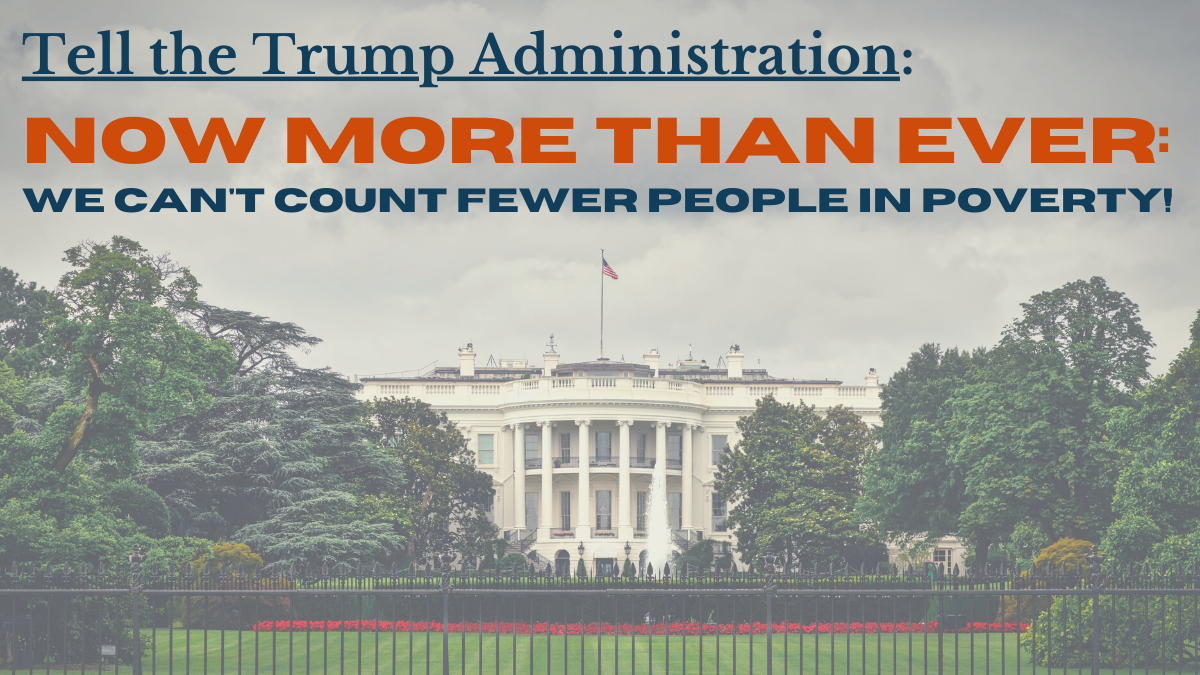
CHN calls for reopening comment period on Trump Administration poverty proposal; says any change to current measurement must be based on science and careful analysis

Now More Than Ever- We Can’t Count Fewer People in Poverty.
The Coalition on Human Needs on Tuesday, April 14 asked the Office of Management and Budget (OMB) to extend or reopen the comment period on a Trump Administration proposal to change the way poverty is measured, and emphasized that any change should be based on scientific research and careful analysis of how vulnerable Americans would be affected.
In a letter written and submitted by CHN Executive Director Deborah Weinstein, CHN emphasized that the comment period should be extended or reopened till at least one month after the conclusion of the current state of emergency relating to the coronavirus pandemic.
Without an extension, the current deadline for submitting comments is midnight tonight (April 14); as of early Tuesday afternoon, more than 23,800 CHN supporters had submitted comments to OMB. You can read CHN’s five-page letter to the OMB here and submit your own comments here.
In her letter, Weinstein urged OMB “to recognize that the COVID-19 pandemic is taking up most of our attention, and that of our members, other service providers and advocates, and the academic research community. It is an urgent priority for staff at the Office of Management and Budget as well.”
Once the current crisis ends, Weinstein wrote, any study of alternative poverty measures should be undertaken through a panel formed under the National Academy of Sciences, and should include not only experienced academic poverty researchers but also diverse people who have experienced poverty, community-based organizations, service providers, and anti-poverty policy experts.
“Consideration of the full array of income and expenditures in a low-income household will be more accurate if people with real-world experience participate,” she wrote.
Weinstein pointed to COVID-19 as an example of “real-world forces that can precipitate massive declines into hardship and poverty.”
“Today’s plummeting economy is unprecedented and extreme,” she wrote. “We see people suddenly without income, who may go into debt in order to afford groceries or pay the rent. Such households or individuals will at least for a time spend above their income. If the economy rebounds, some people will return to work and earn enough to pay back the debt without too much difficulty. Others will not find enough work to get out from under their debt.”
Any alternative poverty measure that counted a family’s debt-financed consumption without accounting for the impact of debt, Weinstein noted, “would not be an accurate measure of this family’s hardship.”
Weinstein stated that improving the way we measure poverty is both important and complicated – but changes should be based on further research and should be informed by “the participation of those with lived expertise, to ensure that the outcome provides greater understanding of what it means to be unable to afford basic necessities in America.”
And she pointed out that Americans are currently seeing the impact of poverty in the disproportionate number of COVID-19 infections and deaths among low income people.
“This is shocking but not surprising,” she said. “Poor American lives are 10-15 years shorter than those of rich Americans. Because of poverty linked to discrimination, African Americans and Latinx similarly face worse outcomes and shorter lives. Children are disproportionately poor, and their poverty throws up roadblocks to education, health, and economic success in adulthood. These are urgent problems whose solutions depend on a clear-eyed analysis of the nature of poverty.”
You can read CHN’s letter here and view CHN’s resource page on the issue here.

